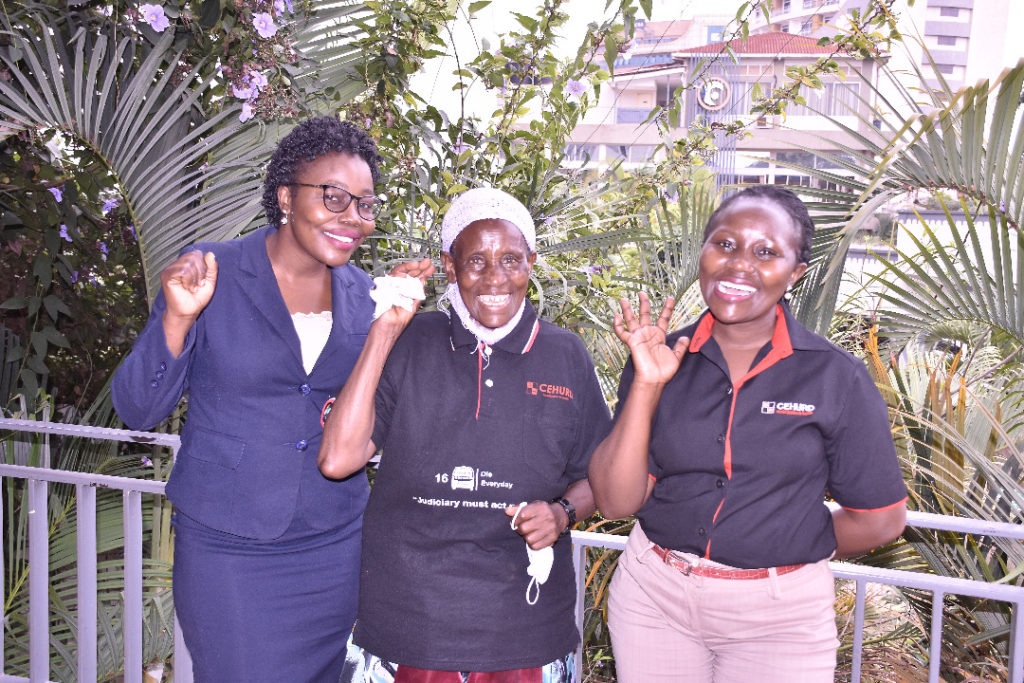
Finalise and pass the National Health Insurance Scheme Bill into law that recognises the unique maternal functions of women by ensuring their ability to access affordable quality maternal health care services from both public and private health facilities.
Esther Dhafa, Programme Officer – Campaigns, Partnerships and Networks Programme, CEHURD
Every year, Uganda commemorates the Safe Motherhood day 17th October.The Center for Health Human Rights and Development (CEHURD) joined the country to commemorate this day by calling upon the Government of Uganda to actualise the declarations in the landmark case, Constitutional petition No. 16/2011. This can happen through enhancing and promoting best practices of safe motherhood during and post COVID-19 TO reduce maternal mortality and morbidity. By doing this, we can realise the “Every Woman Every Child” Global Health Strategy Commitments (EWEC) His Excellency the President of the Republic of Uganda made on 15th May 2016 .
Uganda’s EWEC commitments include among others; ensuring that comprehensive Emergency Obstetric and Newborn Care (EmONC) services in hospitals increase from 70 per cent to 100 per cent and in health centers from 17 per cent to 50 per cent. It also includes ensuring that basic EmONC services are available in all health centers; ensuring that skilled providers are available in hard to reach/hard to serve areas; and reducing the unmet need for family planning from 40% to 20%; increasing focused Antenatal Care 4th visit from 42 per cent to 75 per cent, with special emphasis on prevention of mother-to-child transmission (PMTCT) and treatment of HIV to ensure elimination.
Small steps towards safe motherhood
We do commend the government for the great efforts in reducing the high rates of maternal mortality from 438/100,000 live births in 2011 to an estimated 336/100,000 live births in 2016 (per the Uganda Demographic Health Survey 2016). However, we also note the little progress being made as a country in addressing health related issues that continue to kill women in Uganda helplessly during childbirth. As a best practice therefore, maternal health care services should be available, accessible, acceptable and of good quality in order to enhance safe motherhood.
Over the years and for this specific year, CEHURD continues to work tirelessly to ensure that women and girls are able to access affordable maternal health care services. This has been done through a number of approaches including strategic litigation, research, evidence based advocacy and collective voicing to amplify the need for better health care and service packages countrywide. With these approaches, coupled with government efforts and adoption of best safe motherhood practices, Uganda will be able to reduce maternal deaths caused due to preventable health causes. These causes include haemorrhage (blood loss), unsafe abortion, hypertension, embolism, sepsis, and other direct causes like complications of anaesthesia and caesarian sections, and postnatal depression suicide.
As we continue to commemorate Safe Motherhood, CEHURD remembers all the mothers that have died while giving birth. Unfortunately, an estimate of 6,000 women die annually in Uganda as a result of pregnancy related complications making it about 16 women dying per day (UDHS 2016). This means that today 16 women have died, tomorrow 16 will die and 16 more will die the following day which is very unacceptable. With such scary statistics therefore, Government’s obligation to promote safe motherhood becomes important, to ensure that no woman, or baby dies or is harmed by pregnancy or childbirth. This begins with the assurance of basic safety living for all expectant girls or women in our society.
Landmark judgment for maternal health
The Justices of the Supreme Court of Uganda in CEHURD, Prof Ben Twinomugisha, Rhoda Kukiriza, and Inziku Valente Vs Attorney General (Constitution Petition/\ 16/2011) finally made a nine-year long journey of collective voicing and persistence worthwhile. The justices set a precedent on maternal health care in Uganda to the joy of various civil society organisations under the Coalition to Stop Maternal Mortality in Uganda (CSMMU), development partners, grassroot women and well-wishers who were have been pushing for better maternal health care. Court declared among others that the Government’s omission to adequately provide basic maternal health care services and emergency obstetric care in public health facilities violates the rights to health, life, rights of women, subjects women to inhuman and degrading treatment. The Court also stated that this is inconsistent with and in contravention of Articles 8A, 22, 33, 39 and 45 read together with objectives XIV and XX of the National Objectives and Directive Principles of state policy of the Constitution.

This suit was filed in 2011 seeking to challenge the Government’s omission to adequately provide basic maternal health services and commodities in public health facilities as contravening the right to health, rights of women, and right to life and freedom from cruel, inhuman and degrading treatment. It’s premised on the wrongful deaths of the late Anguko Jennifer who died on 10th December 2010 in Arua Referral Hospital and the late Sylvia Nalubowa who died on 19th August 2010 in Mityana District hospital. Both women died during childbirth when they needed caesarian sections but failed to access the commodities and human resources required to obtain the same.
Call to action
We thus call upon the Government of Uganda to fulfill its statutory obligation by;
- Providing basic maternal health care services to women in Uganda which include among others prenatal care services, skilled medical officers in health facilities, and provision of Emergency Obstetric Care and postpartum care.
- Investing in family planning, antenatal care, safe delivery, newborn care & Post-natal care, and Emergency obstetric care which are the key pillars of Safe Motherhood.
- Prioritizing basic maternity care, primary health care and equity for all women to enable them fully enjoy and fulfil their natural maternal functions which is a fundamental human right (Art 33 of the Constitution).
- Finalise and pass the National Health Insurance Scheme Bill into law that recognises the unique maternal functions of women by ensuring their ability to access affordable quality maternal health care services from both public and private health facilities.
Lastly, informed and effective advocacy is the starting point for bringing about change. We thus call upon all stakeholders to join us in sensitizing the women including the youth and adolescents about safe motherhood and their right to receive and impart accurate sexual reproductive health information and empower them to make informed decisions to be able to keep and stay healthy since a healthy population is able to efficiently contribute to sustainable development. Safe motherhood values the girl child and implies the availability, acceptability, and easy access to health care for women’s prenatal, birth, postpartum, family planning and gynecological needs.
Let us adopt a multisectoral approach to SRHR and Safe motherhood, for better health and healthy lives.
EVERY WOMAN DESERVES TO BE AND FEEL SAFE AS A MOTHER OR MOTHER TO BE.

